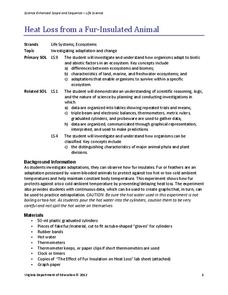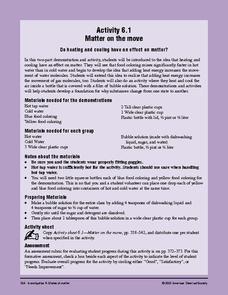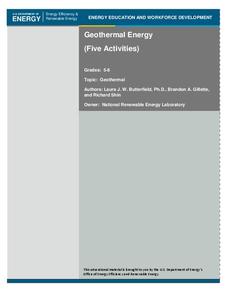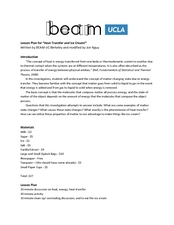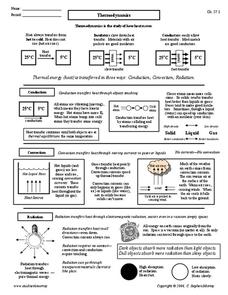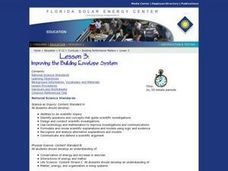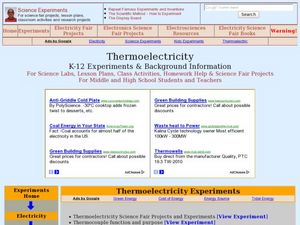Curated OER
Heat Transfer
Students examine heat transfer using energy efficient houses. In this heat transfer lesson students calculate the heat that is transferred between a system and its surroundings.
Curated OER
Radiation and Controlling Heat Flow
The carbon dioxide in our atmosphere and its effect on how heat is contained is summarized here. The flow of heat is explained with details about insulation and conduction. There are diagrams of heat circulation on a global level and...
Virginia Department of Education
Heat Loss from a Fur-Insulated Animal
How do animals adapt to weather changes? Provide your class with the ability to understand adaptations and body temperature as they participate in this hands on experiment, using fake fur and hot water. Pupils collect data and...
Science Matters
Thermal Energy Flow in Materials
The sun sends the earth 35,000 times the amount of energy required by all of us on the entire planet, every day. The fourth lesson in the 10-part series looks at how light energy from the sun transfers into thermal energy. Scholars build...
Virginia Department of Education
Metals, Nonmetals, and Metalloids
How can one easily classify metals, nonmetals, and metalloids? Pupils answer this question as they experiment with unknown substances and perform tests on conductivity, brittleness, and malleability to determine...
Virginia Department of Education
Physical and Chemical Properties of Water
How can you effectively provide detailed concepts of water properties to your high school class in a way they find exciting and challenging at the same time? By letting them play, of course! Through a variety of...
Curated OER
Conductivity Lessons
"Conduct" some simple experiments with these great lesson plans on conductors and insulators!
Rhythm Rhyme Results
Whatʼs the Same and Whatʼs Different?
Learn about radiation, convection, and conduction with a multiple choice worksheet. Each question prompts kids to decide what is different about each form of heat energy transfer, and what is the same.
Discovery Education
Cool It!
Adjust the melting time of ice without varying the temperature! Learners experiment with different materials to decide how the materials affect the rate an ice cube melts. They then connect their findings to the conductivity of each...
Columbus City Schools
Keeping It Hot!
Hot off the presses, this collection of thermal energy activities, lessons, and printables is sure to amaze. Demonstrate how thermal energy moves about in a system using simple materials. Pupils demonstrate their understanding...
American Chemical Society
Matter on the Move
Start this mini unit on matter out by demonstrating how food coloring behaves when placed in cold and in hot water. Then have the class experiment with warm water and soap film. Pupils will learn that an increase in thermal energy also...
US Department of Energy
Geothermal Energy
With Earth Day quickly approaching, as well as many science fairs, why not challenge your class to investigate geothermal energy or other renewable energy resources? There are five driving questions explored in depth here, as well as...
Curated OER
Applications of Energy to the Real World
As an introduction to the concept of energy, this interesting and informative resource would be a terrific addition to a unit. Although there is quite a bit of information presented about kinetic energy, potential energy, and related...
Baylor College
Moving Air
In lab groups, young scientists place aluminum cans with a bubble-solution cap into different temperatures of water to see what size of bubble dome forms. As part of an atmosphere unit in preparation for learning about convection...
Curated OER
"Heat Transfer and Ice Cream!"
Students analyze earth science by creating a frozen treat in class. In this heat transfer instructional activity, students discuss how matter is transformed from solid to liquid and liquid to gas when energy is removed from the equation....
Curated OER
Thermodynamics
In this thermodynamics instructional activity, students learn about insulators and conductors. Students compare the three ways thermal energy is transferred: conduction, convection, and radiation. This instructional activity has 22...
Curated OER
Thermodynamics
In this thermodynamics worksheet, students read about conduction, convection and radiation. They answer 47 questions about heat transfer, thermal equilibrium, insulators, conductors and the states of matter.
Curated OER
Hot Cans and Cold Cans
Students investigate the physics of heating and cooling through conduction, convection, and radiation. Working in groups, they determine the best way to cool a can of water and warm a can of water. Temperature is taken at five minute...
Curated OER
Improving the Building Envelope System
Students explain the different heat transfer mechanisms and how they influence the building envelope. They develop ways in which the building envelope can be improved and test hypotheses about building envelope designs.
Curated OER
Thermoelectricity
Students conduct a series of experiments on thermoelectricity. In this physics lesson, students investigate how thermocouple works. They determine the voltage generated when different conductive materials are held at different temperatures.
Curated OER
TE Activity: Hot Cans and Cold Cans
Students work on problems in which they investigate conduction, convection, and radiation. They attempt to maintain the warmth in one can of soda while cooling the other as much as possible in a thirty minute period. They examine how...
Curated OER
The Envelope System: A Partial Solution
Studnet identify examples of conduction, convection and radiation. They develop an example of a building envelope. They also describe how heat transfer mechanisms can affect home energy costs.
Curated OER
Radiation and Color
Tenth graders explore the relationship between color and heat absorption by measuring the temperature change of water in differently colored test tubes as they are exposed to a heat lamp. They work in small groups to collect data and...
Curated OER
Thermodynamics
In this thermodynamics worksheet, high schoolers answer 12 questions about energy, conduction, convection and radiation, heat, the conservation of energy and atoms at different temperatures.




